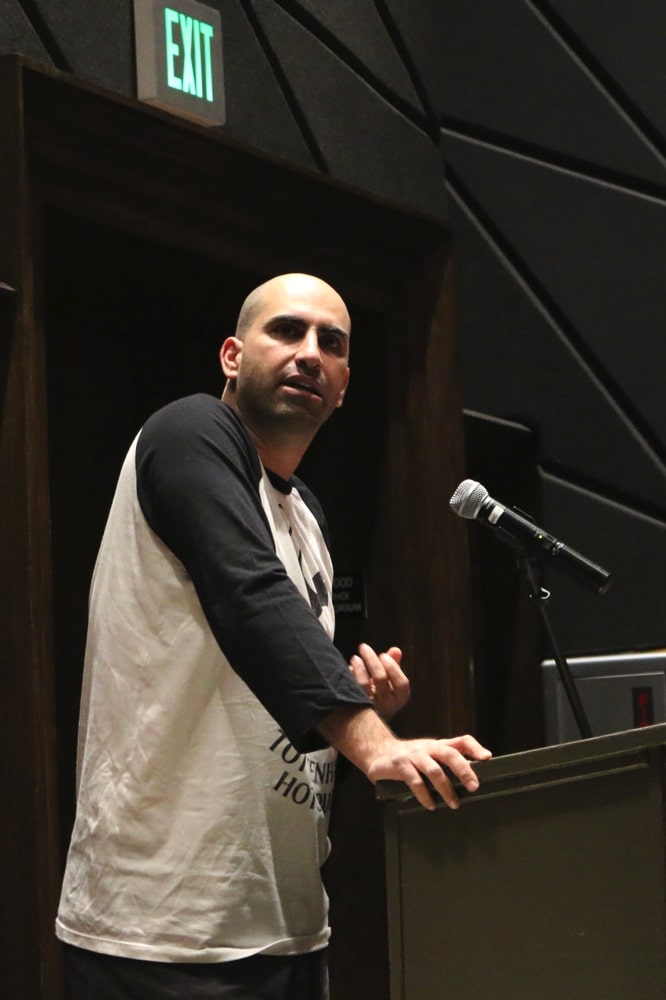
Steven Salaita, former Edward W. Said Chair of American Studies at the American University of Beirut, spoke on the Israel-Palestine conflict in Choi Auditorium Feb. 8. The English, history, American studies, sociology and Media Arts and Culture departments sponsored the event, which drew divided opinions from the student body. Salaita discussed ideas in his book “Inter/Nationalism: Decolonizing Native America and Palestine,” which covers the parallels between the colonization of Native American lands and the interactions between Palestinian and Israeli people.
Salaita’s speaking appearance at the University of California, Los Angeles Oct. 21, 2014 prompted a student submission in the Daily Bruin which criticized the administration for inviting him to campus. The University of Illinois at Urbana-Champaign denied Salaita a tenured faculty position in response to a string of tweets about Israel and its role in the conflict.
Warren Montag, Brown Family Professor in Literature and English and advisor for Students for Justice in Palestine, co-organized the event. Montag welcomed Salaita’s analysis as an avenue to open a dialogue on the issue of Israel and Palestine.

“I felt that he [Salaita] was very unfairly treated. I absolutely reject the idea that he is anti-Semitic. He’s very critical of Israel, but I don’t think he’s any more critical than I would be,” Montag said. “This was a way to talk about how to criticize Israel. Can you criticize Israel without being labeled anti-Semitic? It allows us to have that discussion. It’s a very difficult discussion.”
The decision to host Salaita was a point of contention among members of Occidental’s Jewish community. For Jaydon Levitt (sophomore), a member of Hillel, the parallels he drew appeared inaccurate and one-sided.
“Notably, he paints it as an equal situation to the colonization of the Americas, but what that fails to point out is that the Jewish people have historic, familial and religious ties to the land of Israel,” Levitt said. “I agree that [the Zionist movement] resulted in a very complex situation in which Palestinians were unjustly kicked out of their home and land that they had every right to, but it’s not the same picture of colonization that it was in the Americas, because the Jewish people were there originally, many years before.”

Others in attendance, including Shareef Khwajazada (first year), were less opposed to the speech’s content, citing the unfortunate reality his words reflect.
“I thought Dr. Salaita’s speech was important to hear as he not only spoke factually about the Israeli occupation of Palestine and how said occupation reflects themes similar to the American occupation of Native American lands, but also how such statements are often labeled anti-semitic despite the fact that they reflect the realities of the struggle Palestinians face,” Khwajazada said.
For Professor Michael Gasper of the history department, the talk was informative for his students, who wrote reviews on the lecture for his two classes.
“I thought it was very provocative and interesting for students to think about,” Gasper said. “The students said they had never heard those points of view before, which I think is why we bring speakers to a college campus.”
After the discussion, Salaita encouraged attendees to investigate the matter on their own and responded to various audience questions.
“I thought [the Q&A] was a very productive discourse, and I think he did a very good job of directly answering the questions given to him, and not giving any [poor responses],” Jake Sabitt (first year) said.
Levitt noted that he would like to see the school host speakers with more moderate or opposing points of view in the future to create a more open dialogue.
“Inviting a speaker from the other side, and just providing students the chance to explore different ideas and dissonant opinions, and to form their own ideas about the issue, creates a much more friendly and academically honest discourse for students to engage in,” Levitt said.
![]()






























